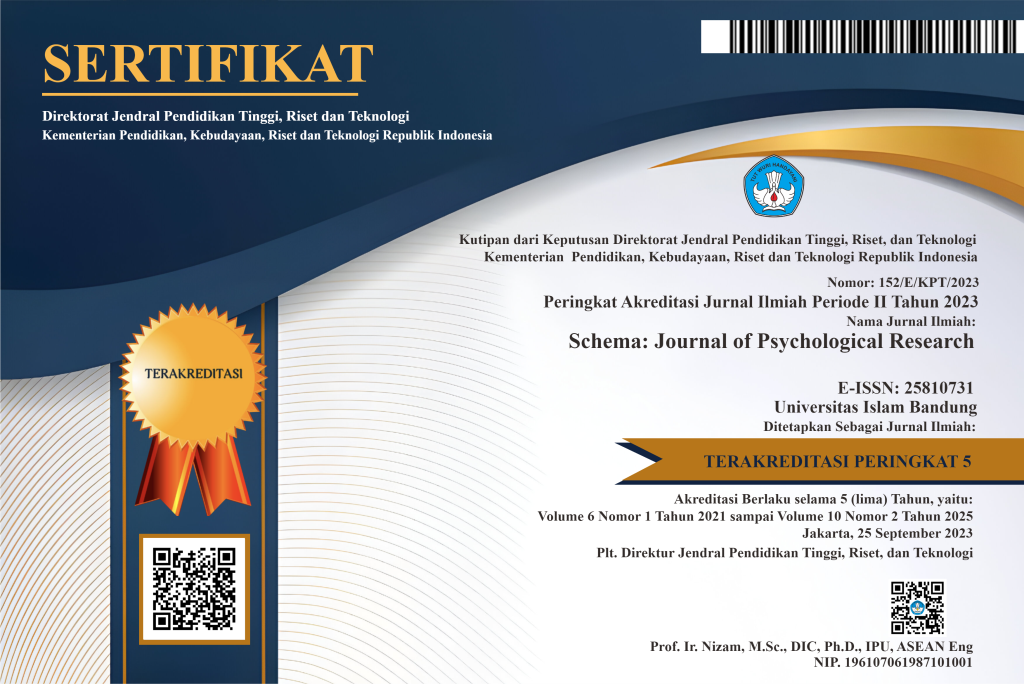PEMBELAJARAN KOOPERATIF SEBAGAI UPAYA MENINGKATKAN MOTIVASI, EMPATI DAN PERILAKU BEKERJASAMA
Abstract
Keywords
Full Text:
PDF (Bahasa Indonesia)References
Adams, A.R. 2013. Cooperative Learning Effects on the Classroom. Michigan: Master of Arts in Education at Northern Michigan University (thesis submitted).
Ahmad, Z & Mahmood, N. 2010. Effects of Cooperative Learning vs Traditional Instruction on Prospective Teacher Learning Experience and Achievement, Journal of Faculty of Educational Sciences. Vol. 43, No. 1, page: 151-164.
Baron, R.A & Branscombe, N.R. (2012) Social Psychology: 13th edition. Pearson Education Inc.
Chiu, M. (1999). Teacher Efects on Student Motivation during Cooperative Learning: Avtivity Level, Intervention Level, and Case Study Analyses. Educational Research Journal, Vol. 14, No. 2.
Chuang, T.T & Nakatami, K. 2002. Improving the Learning Effectiveness of Management Information System Course with Cooperative Learning: Lesson of Empirical Study. Prosiding of IACPS 2012.
Duxbury, J.G & Tsai, L.L. 2010. The Effects of Cooperative Learning on Foreign Language Anxiety: A Comparative Study of Taiwanese and American Universties. International Journal of Instruction, Vol. 3, No. 1.
Hamdani, V.T. 2013. Pengaruh Model Pembelajaran Kooperatif Team Accelerated Instruction (TAI) terhadap Prestasi Belajar Hidrokarbon Siswa kelas X SMA Negeri Mataram tahun ajaran 2012/2013. Mataram: Jurusan Kimia, Fakultas Keguruan dan Ilmu Pendidikan Universitas Mataram (skripsi).
Herrmann, K.J. 2013. The Impact of Cooperative Learning on Student Engagement: Result from an Intervention. Active learning in Higher Education, Vol. 14, No. 3, page: 175-187.
Johnson, D.W; Johnson, R.T & Stanne, M.B. 2000. Cooperative Learning Method: A Meta-Analysis. Minnesota: The University of Minnesota.
Jones, K.A & Jones, J.L. (2008). Making Cooperative Learning Work in the College Classroom: An Application of the “Five Pillars” of Cooperative Learning to Post-Secondary Instruction. The Journal of Effective Teaching, Vol. 8, No. 2, page: 61-67.
Lawrence, E.J., Shaw, P., Baker, D., Cohen, S.B., David, A.S. (2004). Measuring Empathy: Reliability and Validity of The Empathy Quotient. Psychological Medicine, 2004, 34, 911-924. DOI: 10.1017/S0033291703001624.
Lurie, S.J., Schultz, S.H., Lamanna, G. (2011). Assessing Teamwork: A Reliable Five Question Survey. Family Medicine. Vol. 43. No. 10.
Mcmaster, K.N & Fuchs, D. 2002. Effects of Cooperative Learning on the Academic Achievement of Students with Learning Disabilities: An Update of Tateyama-Sniezek’s Review. Learning Disabilities Research and Practice, Vol. 17, No. 2, page: 107-117.
Macpherson, A. 2007. Cooperative Learning: Group Activities for College Courses. Kwantien University College.
Nur Asma. 2006. ModeI PembeIajaran Kooperatif. Jakarta: Depdiknas
Nurtjahjo, F.E & Wimbarti, S. 2010. Metode Pembelajaran Kooperatif TAI (Team Accelerated Instruction) dalam Meningkatkan Keterikatan pada Mata Pelajaran Matematika (Mathematic Engagement) Siswa Kelas Tiga Sekolah Dasar. Yogyakarta: UNiversitas Gadjah Mada (thesis).
Slavin, R.E. 1991. Student Team Learning: A Practical Guide to Cooperative Learning. Washington DC: National Education Association Professional Library.
Slavin, R. E. 2009. Cooperative Learning: Teori, Riset, dan Praktik, edisi Terjemahan. Bandung: Nusamedia.
Tuan, H.S., Chin, C.C., Shieh, S.H. (2005). The Development of Questionnaire to Measure Students Motivation towards Science Learning. International Journal of Science Education, Vol. 27, No. 6, page: 639-654.DOI 10.1080/0950069042000323737.
Widodo, S.A. 2011. Efektivitas Model Pembelajaran Team Accelerated Instruction pada siswa Kelas X SMK Tunas Harapan tahun Pelajaran 2008-2009. Prosiding Seminar Nasional Penelitian, Pendidikan, dan Penerapan MIPA, Fakultas MIPA, Universitas Negeri Yogyakarta, 14 Mei 2011.
Zulaifah, E., Kurniawan, I.N., Nu’man, T.M. (2007). Relevance Competencies for Psychology Graduates. Proceeding Konferensi Internasional Asosiasi Psikologi Industri dan Organisasi tahun 2007 di Universitas Gadjah Mada.
DOI: https://doi.org/10.29313/schema.v0i0.1783
Refbacks
- There are currently no refbacks.
Indexed by:
This work is licensed under a Creative Commons Attribution-NonCommercial-ShareAlike 4.0 International License.












